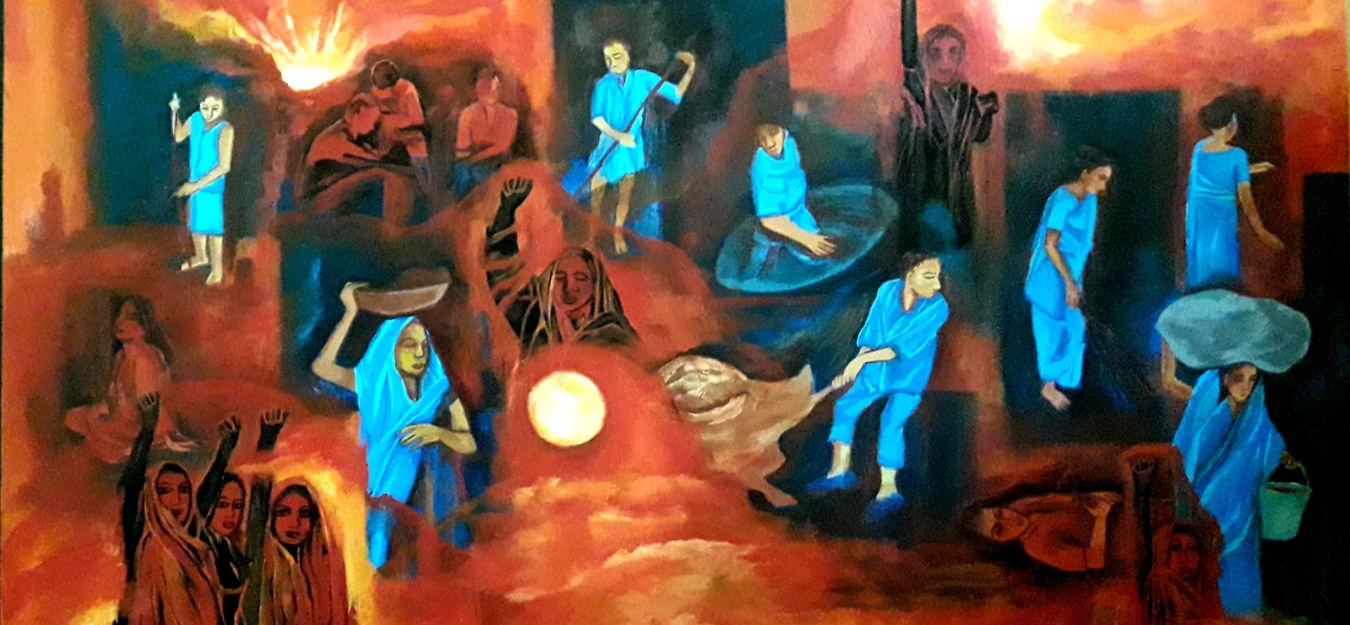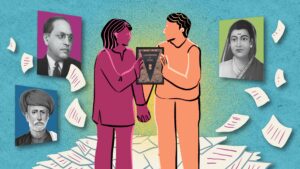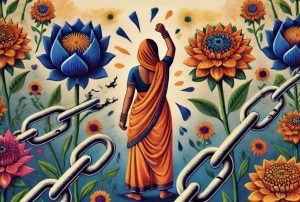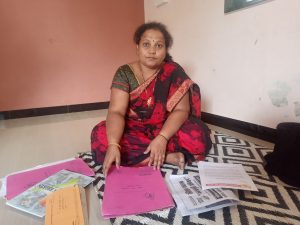Dalit Survivors Of Sexual Violence Deal With Blocks To Justice At Every Step

[This article contains descriptions of sexual and physical violence, which might trigger unwelcome and distressing memories or thoughts. We advise readers to use their discretion before reading]
It can take anywhere between half a day to three months for Dalit survivors of sexual violence – or the families of victims – to get a first information report (FIR) registered with the police, as per a recent joint report of two collectives, the National Council of Women Leaders (NCWL) and the Dalit Human Rights Defenders Network (DHRDN). These delays were experienced in 44% of the cases studied in the report.
Caste becomes a critical factor in how sexual violence survivors access justice, show the findings of the report titled ‘Caste-based Sexual Violence and State Impunity’. Even if an FIR is somehow registered, the woman or her family are threatened with further violence by the accused or his family for refusing to drop the case. Many survivors and their families also struggled to track protracted investigations and trials. Further, institutions dealing with the cases, such as hospitals, often flouted established investigation protocols.
The report documents the experiences of survivors of caste-based sexual violence across 13 states – Bihar, Chhattisgarh, Gujarat, Haryana, Kerala, Maharashtra, Madhya Pradesh, Odisha, Rajasthan, Tamil Nadu, Telangana, Uttar Pradesh and Uttarakhand – and the barriers these women and girls have faced while accessing the justice system.
Upto 3,372 cases of rape against Dalit women and girls were registered in 2020, according to the National Crime Records Bureau (NCRB). On average, close to 10 Dalit women and girls were raped every day in the country, with an increase of 45% in the numbers between 2015 and 2020.
“The increase can be partly attributed to increased reporting of sexual violence cases by Dalit women and girls. However, rates of reporting cases by Dalit survivors of sexual violence still remain extremely low,” the report stated.
However, analyses by experts have shown that these numbers are grossly underreported. As has been pointed out often, the NCRB data only includes cases for which FIRs have been registered. However, not all survivors of sexual violence are able to get an FIR filed as has been found by several studies (see here and here).
Suhanthi*, a 27 year-old Dalit school teacher in Tamil Nadu, alleged rape when a fellow teacher from the dominant Vaniba Chettiyar community refused to marry her after promising to do so. (Rape, when defined as the breaking of the promise of marriage between two sexually engaged adults, sits on a contentious legal turf. Marriage with someone else soon after having sex with another cannot not be construed as “lack of consent” on the latter’s part, the Kerala High Court recently observed.)
Suhanthi alleged that the man also took her money and jewellery and quoted him as saying: “My caste and family’s purity will be destroyed (if I marry you).”
Instead of filing an FIR, the police tried to arrange for her to marry the accused. The family of the accused allegedly hit her with an asbestos sheet while using casteist slurs for seeking police intervention. Suhanthi said she waited three months to get an FIR registered. While the perpetrator has been arrested, the family of the accused is allegedly trying to intimidate Suhanthi into withdrawing or settling the case.
Her experience is common to many Dalit survivors of sexual violence, as the report shows.
Caste dynamics
“Dalit women’s bodies have been projected as markers of their Dalit identity and sexual violence is a tool for exercise of power and subordination of Dalit women,” the NCWL-DHRD report stated.
Rape is used as a tool to suppress the rights and dignity of not just Dalit women, but also her entire community, noted researcher Jyoti Diwakar in a paper titled “Sex as a Weapon to Settle Scores against Dalits”. Rape then becomes the consequence of land disputes, factional rivalry, and above all caste dominance, she noted.
Sexual violence by men from land-owning dominant caste families against Dalit women and girls who work as agricultural labourers in their farms was a common thread in most cases reported across the 13 states studied. In all cases where the perpetrator’s caste was known, it was a dominant social group.
The ownership of land, property and other economic assets grants members of the dominant caste groups political, legal and administrative power through networks of kinship and influence, studies have shown. This power is used as to sexually exploit Dalit women and further prevent survivors from accessing the justice system.
In 78% of the cases in the report, it was found that the survivors or families of victims were threatened by the accused, his family or other members of the community and pressured to either not complain or withdraw the case/settle for a compromise. Of these 10%, did result in a “compromise” wherein the survivor or her family agreed to change their statement to the police or court and stopped cooperating with the investigations.
Denial of justice
“Sexual violence against Dalit women and girls is a violation of their fundamental rights to equality, life and dignity. The stigma associated with it as well as the caste discrimination by state authorities compounds the trauma experienced by Dalit survivors and act as barriers to their access to justice,” said Manjula Pradeep, Dalit lawyer and national convenor, NCWL and DHRD.
Caste-based attitudes and discrimination run through the entire law enforcement and criminal justice system including the police, medical officials, prosecutors and judges and these attitudes act as impediments in access to justice for Dalit women and girls, noted the NCWL report.
The crisis is further exacerbated by the lack of adequate gender and caste diversity within the justice system: only 10% of the Indian police force is female, as per data released in August 2021 by the Ministry of Home Affairs in Lok Sabha. Despite having a reserved quota in the police force for SC candidates, only eight states and union territories met or exceeded the quota for constables, the report pointed out.
Difficulties in filing FIRs
In most cases, an FIR was registered only after the intervention of NGOs or other rights activists, the report said.
The reluctance to include the appropriate provisions under the Scheduled Caste & Scheduled Tribes (Prevention of Atrocities) Act weakens the case of the survivor. Under the SC & ST (POA) Act there is no provision for an anticipatory bail and the quantum of punishment in the event of conviction is higher.
In one out of the 50 cases, no FIR was registered due to constant pressure and threats from the accused and his family, which included the sarpanch of the village. In seven other cases, despite an FIR being registered, the offence of rape or attempt to rape was not included despite the survivor’s insistence or despite injuries to her genital areas.
In 15% of the cases where survivors or families of victims were able to get an FIR registered, the police did not include applicable provisions of the SC and ST (PoA) Act, which often led to dilution of the case. Even in cases for which the FIR was registered under the SC & ST (PoA) Act, it was after a request was made by the survivor or the victim’s family or due to pressure from the Dalit Women Human Rights Defenders, a group of activists drawn from NCWL and DHRDN, the report said.
The police’s failure to file an FIR on time can severely impact the chances of a conviction in the case – a medical examination is generally not conducted until an FIR has been registered and if it is delayed it affects the possibility of obtaining evidence, of rape as well as against the perpetrator. This becomes a huge block because Indian courts rely disproportionately on medical evidence in rape cases, the report pointed out.
Delayed investigations
The report has criticised police inaction in different scenarios: they often failed to respond swiftly when victims were first reported missing and in most such cases, the bodies of the victims, raped and murdered, were found long after a complaint is made. In the case of survivors, the police did not act fast enough against complaints of harassment, leading to rape and, sometimes, murder.
The lack of active and timely investigation on part of the police makes Dalit women and girls more susceptibe to sexual abuse, found the report.
Shital*, a Dalit woman from Maharashtra, was being repeatedly harassed. She tried filing an FIR against the accused who threatened and abused her using casteist slurs. But no action was taken by the police. Three months after she complained, Shital was abducted by the accused and coerced into “marriage” and forced sex. She managed to escape after four months and sheltered at her mother’s home. But the accused tracked her down and when he was blocked at the door, shot her mother dead.
The police also intimidate and threaten survivors and victims’ families when they go to file a report or pressure them into withdrawing or settling cases, as we said earlier. Families are also often forced into cremating victims by state authorities in an attempt to destroy incriminating evidence, as BehanBox has reported.
A police investigation of rape cases has to be completed within two months, per the Code of Criminal Procedure. However, as many as 25.5% cases were pending investigation in 2020, according to NCRB data.
The report found that delays in the completion of the investigation or filing of the chargesheet were common. In 52% cases, the charge sheet was either filed after two months or had yet to be filed.
Medico-legal protocols overlooked
Many rape survivors were not provided with a copy of the medical examination report. In cases involving murder, the post-mortem report had not been shared with the victims’ family. Not having access to medical reports often blindsides survivors during the trial, especially if the report notes that rape could not be proven, said the report.
There have also been complaints of manipulation of medical, forensic, and post-mortem reports by state authorities to establish lack of evidence. Some survivors have also claimed that they were coerced into signing consent forms or medical examination reports without being informed about the details of their content.
The rules of the health ministry’s Medico-Legal Care Guidelines for Survivors or Victims of Sexual Violence were not being followed or were being poorly implemented by examining medical professionals across states, the investigations for the report showed. For instance, the two-finger test, an irrelevant examination of the vagina used to check if the hymen has been ruptured – supposedly to verify if the victim/survivor has an active sexual life – is still done though it was banned by the Supreme Court in May, 2013.
However, the report found that at least 34% survivors confirmed having undergone the two-finger test during their medical examination. “From a human rights perspective, conducting a medical test on survivors that has no probative value is a violation of their personal integrity and could lead to further trauma,” stated the report.
High pendency rates
Trials have been pending in 80% of the cases for over two months and in 6% of the cases for over six years, found the report. There were convictions in only 4% of the cases, while 8% cases were closed following a compromise. The pendency percentage in cases of rapes of Dalit women and girls was 96.3%; the national average was 94.2%, per NCRB data.
Delay in trials often lead to the accused being let off on bail. The accused frequently fails to comply with the conditions of the bail bond, and harasses the survivor or the family of the victim to get the case withdrawn.
State governments are required by the 2015 amendment to the SC & ST (PoA) Act to set up exclusive Special Courts, which will ensure that trials are completed within two months, for the trial of offences under the SC & ST (PoA) Act. However, only 13 states across the country have set up such Special Courts.
State governments are also required to identify atrocity-prone districts so that measures can be taken to improve women’s safety including the appointment of a special officer to monitor implementation of the Act. However, only 12 states have identified such atrocity-prone areas.
Under the Act, victims and survivors of rape are entitled to a minimum compensation of Rs 5,00,000 and victims/survivors of gang rape receive Rs 8,25,000. But, in 31% of cases the compensation was not received. In a few cases, compensation was not paid due to the lack of an FIR, or only a part of it was received due to police failure to file a charge sheet.
While the relief amount was to be paid within seven days of the violence being reported, it was often delayed between two months to three years.
No psycho-social support
“There are no functional provisions for psycho-social support for survivors of sexual violence, especially those who are Dalit,” said Dalit activist and lawyer Pradeep.
Even when counselling services were available, the staff were not trained to deal with survivors of sexual violence, found the report.
The government had set up the Nirbhaya Fund in 2013 to finance state initiatives aimed at enhancing the safety and security of women. These funds, allocated to state governments, serve various purposes, including setting up of one-stop service centres, safe city shelter projects, among others. But only 49% of the allocated funds in FY22 have been utilised, according to the latest official data released by the Ministry of Women and Child Development.
*Names changed to protect identities. Case studies are from the report.
We believe everyone deserves equal access to accurate news. Support from our readers enables us to keep our journalism open and free for everyone, all over the world.




